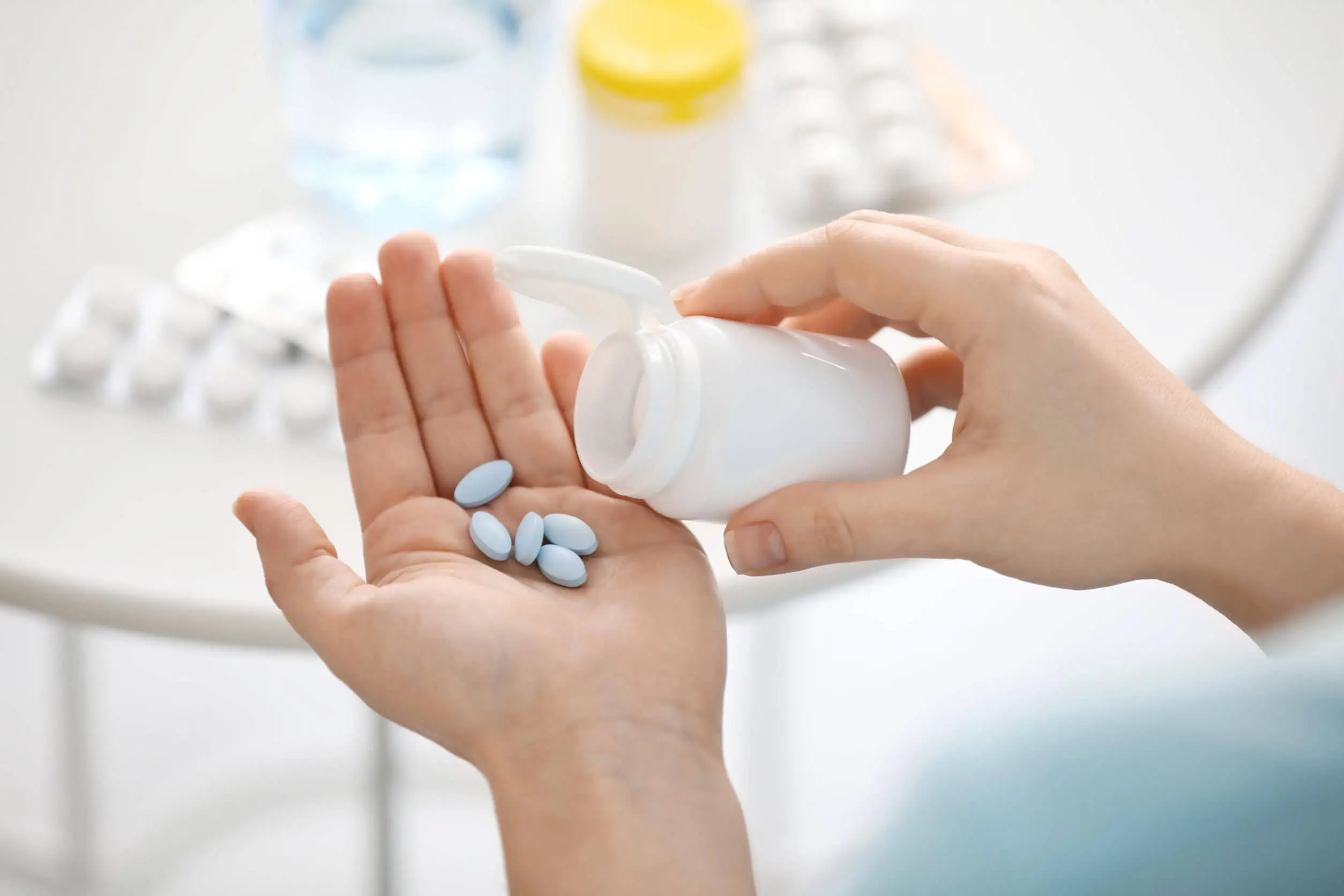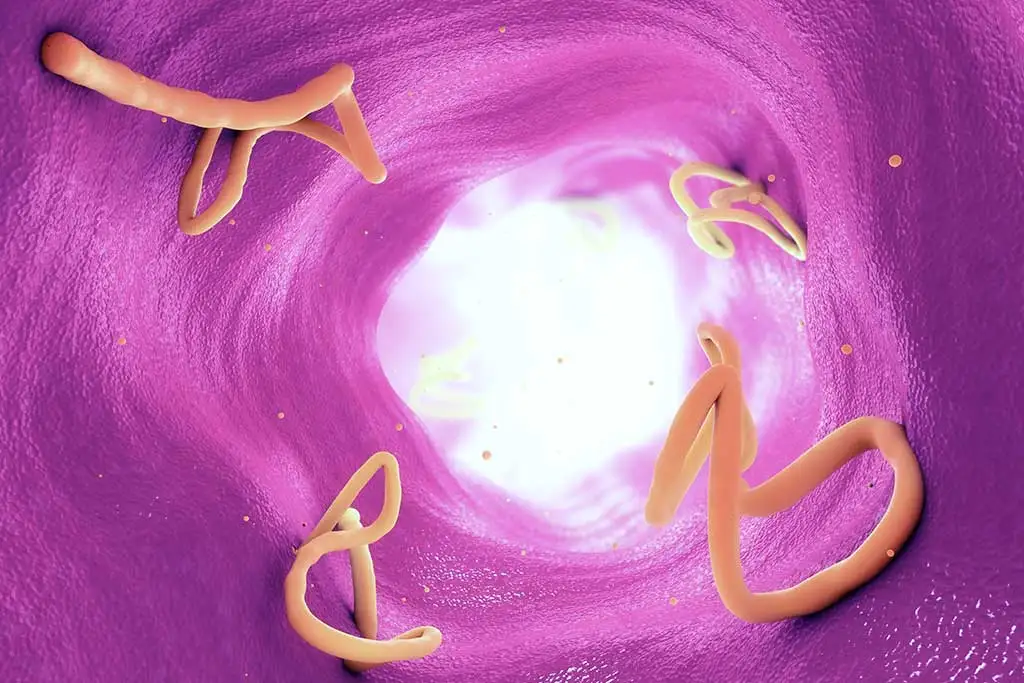14 Medications for Intestinal Parasites

Medications for intestinal parasites are usually prescribed after a stool examination or when there are obvious symptoms of infection. Most of them are taken once, but some require several intakes.
The presence of intestinal parasites in the body causes uncomfortable symptoms, such as abdominal pain, diarrhea, nausea, and fatigue. In the long term, they can have more serious consequences, especially for children. That’s why they should always be treated.
Today, there’s a wide range of medications for intestinal parasites. Most of them are safe and effective. However, they should always be prescribed by a doctor, as they can also cause adverse effects.
1. Medications for intestinal parasites: Albendazole
Albendazole is a drug that undermines the cell and tissue structures of intestinal parasites and protozoa. This causes them to die.
It’s used for hookworm, ascariasis, enterobiasis, strongyloidiasis, giardiasis, taeniasis, and trichocephalosis.
A single dose of 400 milligrams is usually prescribed. However, on some occasions, the physician may order higher doses.
It may produce side effects such as the following:
- Headaches or abdominal pain
- Dizziness
- Vomiting
- Diarrhea
- Vertigo
- Hives
- Elevation of liver enzymes
2. Mebendazole
Mebendazole is used to treat conditions such as hookworm, ascariasis, enterobiasis, echinococcosis, taeniasis, and trichocephalosis. It causes the death of intestinal parasites by destroying the cellular functions that provide them with energy.
The usual dose is 100 milligrams, 2 times per day for 3 days. In some people, it causes headache or abdominal pain, fever, reddening of the skin, hair loss, alteration of blood cells, or elevation of liver enzymes.

3. Medications for intestinal parasites: Nitazoxanide
Nitazoxanide inhibits the enzymes of some cells that intestinal parasites require to live. It’s used to treat amoebiasis, hookworm disease, ascariasis, balantidiasis, blastocystosis, cryptosporidiosis, enterobiasis, strongyloidiasis, giardiasis, taeniasis, and trichocephalosis.
It’s usually taken in 2 doses per day of 500 milligrams for 2 days. For children older than 1 year, doses of 100 milligrams are used.
May cause headache or abdominal pain, dizziness, vomiting, anemia, greenish urine, and elevated liver enzymes.
4. Piperazine
Piperazine is used for the treatment of ascariasis and enterobiasis. This drug is a vermifuge that eliminates intestinal parasites, particularly worms, by blocking their muscular response. In other words, it paralyzes them.
That’s why they can be eliminated while still alive.
The dose for ascariasis is 65 milligrams per kilogram of weight of the patient. It should be taken one dose per day for seven days. It sometimes causes side effects such as abdominal pain, dizziness, vomiting, diarrhea, and urticaria.
5. Medications for intestinal parasites: Pyrantel
Pyrantel is another drug to attack intestinal parasites. It acts in a similar way to piperazine, paralyzing the worms. It is used in cases of hookworm, ascariasis, and enterobiasis.
The usual dose is 11 milligrams per kilogram of body weight in one dose. It can be repeated after two weeks in the case of enterobiasis. In some people, it causes abdominal pain and cramping, dizziness, nausea, headache, drowsiness, and lack of appetite.
6. Ivermectin
Ivermectin acts by altering the muscle and nerve cell structure of some intestinal parasites and other protozoa. In particular, it attacks larvae. It’s used in the treatment of strongyloidiasis, scabies, filariasis, onchocerciasis, and pediculosis (lice).
This drug is only used in adults or children weighing more than 15 kilograms.
The dose is 200 micrograms per kilogram of body weight. In some people, it causes side effects, such as dizziness, vomiting, diarrhea, constipation, abdominal pain, weakness, drowsiness, lack of appetite, urticaria, and tremors.
7. Thiabendazole
Thiabendazole is another drug that inhibits cell enzymes and causes the death of intestinal parasites or their larvae. It’s used to treat strongyloidiasis, visceral migrans larva (toxocariasis), and cutaneous migrans larva.
A single dose of 25 milligrams per kilogram of body weight is usually used. The physician indicates for how many days it should be used, according to each patient. It can cause abdominal pain, dizziness, vomiting, diarrhea, weight loss, dry mouth, and tiredness.
We think you may also enjoy reading this article: How to Make a Cleansing Juice to Empty Your Intestines Naturally
8. Secnidazole
Secnidazole is used for the treatment of amebiasis and giardiasis. This drug interferes with the DNA of intestinal parasites and other protozoa so that they’re killed.
The dose for adults is 2 grams once. For children, 30 milligrams per kilogram of weight. It’s taken with food.
In some people, it causes a reduction of white blood cells in the blood, inflammation of the tongue and mucous membrane of the mouth, metallic taste, dizziness, or stomach pain.
9. Medications for intestinal parasites: Metronidazole
Metronidazole is one of the most commonly used drugs to combat intestinal parasites. Although it’s an antibiotic and therefore attacks bacteria, it’s also effective in neutralizing protozoa.
It interferes with the DNA of these organisms and causes their death. It’s mainly used for amebiasis and giardiasis.
The dose for amebiasis is 400 to 800 milligrams three times a day for 5 to 10 days. For giardiasis, 250 milligrams three times daily for 5 days. It sometimes causes headache or abdominal pain, dizziness, vomiting, diarrhea, inflammation of the oral mucosa, metallic taste, and hives.
Like this article? You may also like to read: How to Cleanse Toxic Substances from Your Intestines
10. Praziquantel
Praziquantel is a drug that causes paralysis in worms. The body’s immune system then kills them.
It’s used in the treatment of infections such as cysticercosis, schistosomiasis, and taeniasis. Caution should be exercised in people with depressed immunity.
The dose for tapeworm is 5 to 10 milligrams per kilogram of body weight. For cysticercosis, it’s 50 milligrams per kilogram of body weight, divided into 3 daily doses for 14 days. For schistosomiasis, 20 milligrams per kilogram of body weight, in 3 doses for 1 day.
It’s possible that this medication for intestinal parasites may cause side effects:
- Dizziness
- Vomiting
- Headaches or abdominal pain
- Weakness
- Hives
11. Iodoquinol
Iodoquinol is almost always used to treat amoebiasis. Also for infections caused by Dientamoeba fragilis and Balantidium coli. It’s not recommended for children, people who are allergic to iodine, or those with liver disease.
The usual dose is 30 to 40 milligrams per kilogram of body weight. It’s taken every 8 hours for 20 days. After 2 to 3 weeks the cycle can be repeated.
It sometimes causes headache or abdominal pain, vomiting, diarrhea, urticaria, fever, neuropathies, and goiters.
12. Diloxanide-furoate
Diloxanide-furoate is used to treat amebiasis. It fights intestinal parasites that are resistant to other drugs and cause persistent infection.
It’s contraindicated for pregnant or breastfeeding women.
The dose is usually 500 milligrams every 8 hours for 10 days. It’s only used in children weighing more than 25 kilograms. The dose, in this case, is 20 milligrams per kilogram of weight, divided into 3 daily doses for 10 days.
This is one of the most effective drugs for the treatment of intestinal parasites. It’s estimated to eradicate them in 86% of patients. It rarely causes side effects.

13. Medications for intestinal parasites: Paromomycin
Paromomycin is used for acute and chronic amoebiasis. It’s also used to treat taeniasis and Dysentamoeba fragilis infection. This drug inhibits the action of intestinal parasite enzymes.
The usual dose is 25 to 35 milligrams per kilogram of body weight every 8 hours for 5 to 10 days. It may cause abdominal or headaches, vomiting, diarrhea, and dizziness.
14. Emetine and dehydroemetine
Emetine and dehydroemetine are amoebicides, i.e. substances that kill amoebae. Their characteristics are very similar to those of metronidazole. The latter is considered safer.
The usual dose is 1 milligram per kilogram of body weight, once a day, for 5 days. Side effects are very common and include dizziness, nausea, vomiting, headaches, and even necrosis at the injection site.
Medications for intestinal parasites require a prescription
In general, medications for intestinal parasites should not be used by children under two years of age or by pregnant or breastfeeding women. Caution should also be exercised in people with immunity problems or liver disease.
It’s important to remember that medications for intestinal parasites, like any other drug, must be prescribed by a physician. It’s also very important to follow your doctor’s instructions in detail to avoid complications.
All cited sources were thoroughly reviewed by our team to ensure their quality, reliability, currency, and validity. The bibliography of this article was considered reliable and of academic or scientific accuracy.
- Akinboye, E., & Bakare, O. (2011). Biological activities of emetine. The Open Natural Products Journal, 4(1), 8-15. https://benthamopen.com/ABSTRACT/TONPJ-4-8
- Bisoffi, Z., Buonfrate, D., Angheben, A., Boscolo, M., Anselmi, M., Marocco, S., Monteiro, G., Gobbo, M., Bisoffi, G., & Gobbi, F. (2011). Randomized clinical trial on ivermectin versus thiabendazole for the treatment of strongyloidiasis. PLoS neglected tropical diseases, 5(7), 1-6. https://journals.plos.org/plosntds/article?id=10.1371/journal.pntd.0001254
- Campbell, S., & Soman-Faulkner, K. (2023). Antiparasitic Drugs. StatPearls. https://pubmed.ncbi.nlm.nih.gov/31334971/
- Ceruelos, A. H., Romero-Quezada, L. C., Ledezma, J. R., & Contreras, L. L. (2019). Therapeutic uses of metronidazole and its side effects: an update. European Review for Medical and Pharmacological Sciences, 23(1), 397-401. https://www.actuamed.com.mx/sites/default/files/asset/HTML/081220n/nota-2.pdf
- Chen, W., Mook Jr, R. A., Premont, R. T., & Wang, J. (2018). Niclosamide: Beyond an antihelminthic drug. Cellular signalling, 41, 89-96. https://www.sciencedirect.com/science/article/pii/S0898656817301018
- Kikuchi, T., Koga, M., Shimizu, S., Miura, T., Maruyama, H., & Kimura, M. (2013). Efficacy and safety of paromomycin for treating amebiasis in Japan. Parasitology international, 62(6), 497-501. https://www.sciencedirect.com/science/article/pii/S1383576913000937
- Eke, I. G., Eze, I. O., Ezeudu, T. A., Eze, U. U., Anaga, A. O., & Onyeyili, P. A. (2017). Anti-trypanosomal activity of secnidazole in vitro and in vivo. Tropical Journal of Pharmaceutical Research, 16(3), 535-541. https://www.ajol.info/index.php/tjpr/article/view/154250
- Kappagoda, S., Singh, U., & Blackburn, B. G. (2011, June). Antiparasitic therapy. Mayo Clinic Proceedings, 86(6), 561-583. https://www.sciencedirect.com/science/article/pii/S0025619611600554
- Malik, K., & Dua, A. (2022). Albendazole. StatPearls. https://www.ncbi.nlm.nih.gov/books/NBK553082/
- Martin, R. J., Robertson, A. P., & Choudhary, S. (2021). Ivermectin: an anthelmintic, an insecticide, and much more. Trends in parasitology, 37(1), 48-64. https://www.cell.com/trends/parasitology/fulltext/S1471-4922(20)30290-7
- Shakya, A., Bhat, H. R., & Ghosh, S. K. (2018). Update on nitazoxanide: a multifunctional chemotherapeutic agent. Current drug discovery technologies, 15(3), 201-213. https://www.ingentaconnect.com/content/ben/cddt/2018/00000015/00000003/art00007
- Subash, K. R., & Padmavathi, S. (2022). Chemotherapy of Parasitic Infections. En S. C. Parija y A. Chaudhury (Eds.), Textbook of Parasitic Zoonoses (pp. 75-82). Springer Nature Singapore. https://link.springer.com/chapter/10.1007/978-981-16-7204-0_8
- Thakur, R. K., & Patel, S. P. (2020). Mebendazole. StatPearls. https://europepmc.org/books/nbk557705
- Thomas, C. M., & Timson, D. J. (2018). The mechanism of action of praziquantel: six hypotheses. Current Topics in Medicinal Chemistry, 18(18), 1575-1584. https://www.ingentaconnect.com/content/ben/ctmc/2018/00000018/00000018/art00008
This text is provided for informational purposes only and does not replace consultation with a professional. If in doubt, consult your specialist.








